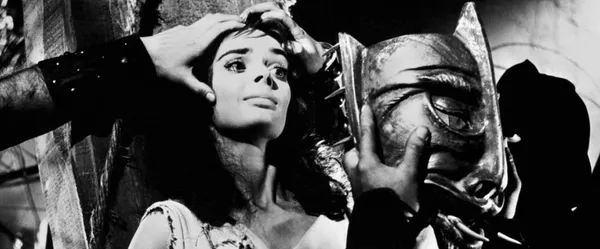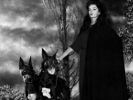Eye For Film >> Movies >> Black Sunday (1960) Film Review
Black Sunday
Reviewed by: Jennie Kermode

Available in two different versions and under an impressive 22 different titles (some of which have no discernable connection to the plot), Black Sunday is one of those historic films whose technical achievements and influence far outshine its qualities as a piece of entertainment. On the surface it's a B-movie, the story of a vengeful witch who plans to possess the body of an unwitting young princess, but it's made with remarkable skill and a visual aesthetic that will thrill even cynical viewers.
Originally filmed in Italian, the film was later re-cut and dubbed into English for the US market. The dubbing itself is considerably better than in many contemporary works but unfortunately much of the subtlety present in the language of the original is lost, with some of the film's stronger moments likewise excised by the cut. That said, Bava's sumptuous visuals remain, with the director innovative in his employment of multiple side lights to give scenes a luminous quality and make playful use of shadows. The set design is gorgeous and, as well as inspiring many Hammer Horror classics, had a strong influence on the young Tim Burton. It's all the more impressive given the tiny budget Bava had to work with. His smoothly gliding camera defies the constraints of the time and yet sits curiously at odds with physical acting from some cast members which harks back to the silent era, conveying mental state through agitated movement.

The two different versions have different soundtracks, both a little overblown - the US one more so - yet their drama adds to the sense of fun that the film evokes in retrospect, for all that it was designed to terrify. It's still powerfully atmospheric and some scenes will send real shivers down your spine, but of course it now also carries a certain camp cachet. The packing-in of horror clichés only intensifies this. Much of this stems from its source material - one of Nikolai Gogol's more fanciful Gothic imaginings - but Bava milks it for all it's worth. He certainly knows how to spin a good yarn. There's scarcely a moment when the pace slackens, with a sense of supernatural threat present throughout. Witches, vampires, secret passages, burning at the stake - it's got everything fans of the subgenre love in one appealing package.
Every horror film of this type needs a strong villain and here Barbara Steele gives it her all, clearly enjoying the dual role of evil witch and fearful innocent. Hers is one of the first lead villain roles for a woman in popular cinema and it paved the way for many others in a genre that still leads the field when it comes to forceful female characters. Her lines may sometimes be silly but she delivers them with aplomb, seeing dangerous even without her Satanic powers.
Important viewing for would-be filmmakers and historians of cinema, Black Sunday is also fun to watch and, though its power has faded with time, still deserves to make a comeback.
Reviewed on: 22 Apr 2013

















